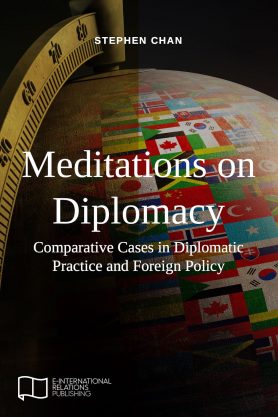

A growing number of scholars in and out of IR are studying the importance of cultural artifacts - popular or otherwise - for the phenomena that make up the core of our discipline. Looking at a television franchise like Battlestar Galactica (BSG) is no longer news within the discipline of International Relations.

The first introductory textbook to take a diplomatic approach, this text is essential reading for all those looking to take their first steps into the study of international relations in an era of uncertainty. Introducing students to the major theories and issues in international relations, each chapter: is written to a common structure, dividing each topic into sections with learning objectives within each section to provide points of focus for students and instructors includes extensive text box examples and short case studies for reflection and discussion provides key terms, key takeaways and simple exercises which require short responses offers a suggested list of further readings for those who wish to explore a topic further. Presenting complex ideas, concepts and arguments in a straightforward and conversational way, the textbook explains international relations from a diplomatic perspective, emphasizing co-existence in the absence of agreement, and developing students’ ability to make sense of the current conditions of international uncertainty. This exciting new textbook provides an accessible and lively introduction to international relations for students encountering the subject for the first time. Providing a comprehensive overview of IR scholarship on responsibility, this accessible and interdisciplinary text will be a valuable resource for scholars and students in many fields including IR, international law, political theory, global ethics, science and technology, area studies, development studies, business ethics, and environmental and security governance. Chapters with an empirical focus zoom in on particular actor constellations of (emerging) states, international organizations, political movements, or corporations, or address how responsibility matters in structuring the politics of global commons, such as oceans, resources, or the Internet. Contributions cover the way in which responsibility is theorized across different approaches in IR and relevant neighboring disciplines and demonstrate how responsibility matters in different policy fields of global governance. This handbook both reflects upon an emerging field based on an engagement in the most crucial theoretical debates and serves as a foundational text by showing how deeply a discussion of responsibility is embedded in broader questions of IR theory and practice. What does responsibility mean in International Relations (IR)? This handbook brings together cutting-edge research on the critical debates about responsibility that are currently being undertaken in IR theory. Moving beyond western debate, orthodox perspectives, and uncritical histories this volume is essential reading for all scholars and advanced level students concerned with the history, development, and future of international relations.? The Routledge Handbook On Responsibility In International Relations

What’s the Point of International Relations casts a critical eye on what it is that we think we are doing when we study and teach international relations (IR).


 0 kommentar(er)
0 kommentar(er)
